Your vocabulary is about to get a lot more colorful. Let's get a move on, y'all.

48 Southern Phrases That’ll Keep Y’All Entertained


Y’all
If you asked someone from outside the South—or outside the United States—to name one southern usage, chances are they would answer with “y’all.” While it’s a combined version of “you all,” it’s more than that, and there’s no universally agreed upon origin story. Some theories suggest that it dates back to the plural form of “you” found in Old English. Another possible explanation is that it evolved from the Scots-Irish phrase “ye aw,” rather than from “you all.”

Bless your heart
Some southern expressions are actually thinly veiled burns, with the most famous being “bless your heart.” Though it sounds like a sweet sentiment, it’s often used to subtly question someone’s intelligence or common sense while still sounding polite. That said, it can actually be polite and kind, depending on the context. “It’s an expression that has a couple of different implications that go with it,” Kirk Hazen, an English professor at Western Virginia University and an expert on American dialects, told MEL Magazine. “And it all is related to power—the power of who’s talking and who’s listening. I know it’s gotten really popular. In linguistics, we call that ‘enregistered.’” Enregisterment is when a way of speaking becomes known and recognized as part of a certain group, place or identity.

Ain’t got the sense God gave a billy goat
“One of my favorite southern expressions is ‘Ain’t got the sense God gave a billy goat,’” Katie Moseman, author of Fixin’ to Eat: Southern Cooking for the Southern at Heart, tells Reader’s Digest. “I learned it from my mother, whose family comes from Georgia and South Carolina.” According to Moseman, it means someone who lacks common sense or is a little absent-minded.

Doesn’t amount to a hill of beans
When something is considered to have little value, Southerners may say that it “doesn’t amount to a hill of beans.” One theory is that this southern phrase dates back to at least 1858 and originally referred to a literal pile of beans in a book on farming that described how to grow lima beans. The author suggested that if one bean was useless, then a whole hill of beans would be even more so. The phrase gained popularity when it was used at the end of the 1942 film Casablanca, when Humphrey Bogart says to Ingrid Bergman, “Ilsa, I’m no good at being noble, but it doesn’t take much to see that the problems of three little people don’t amount to a hill of beans in this crazy world.”

Fixin’ to
In the South, if you’re about to do something, or thinking about doing it, you may say that you’re “fixin’ to.” This means you have every intention of doing something, but you may take your time getting around to it. The Yale Grammatical Diversity Project English in North America explains that this phrase is most common in the South Atlantic and the Gulf States. Further, it is thought to be related to the African American English phrase “finna”—which also refers to something that will happen in the future—though the exact connection is unclear.

What all/who all
To find out the full extent of something, some parts of the South use the construction “[wh- question word] all”—as in “what all,” “where all” and “who all.” According to English in North America, these phrases emphasize “the comprehensive scope” of the question and are primarily used in the South and South Midland regions, including North Carolina and the Ozarks.
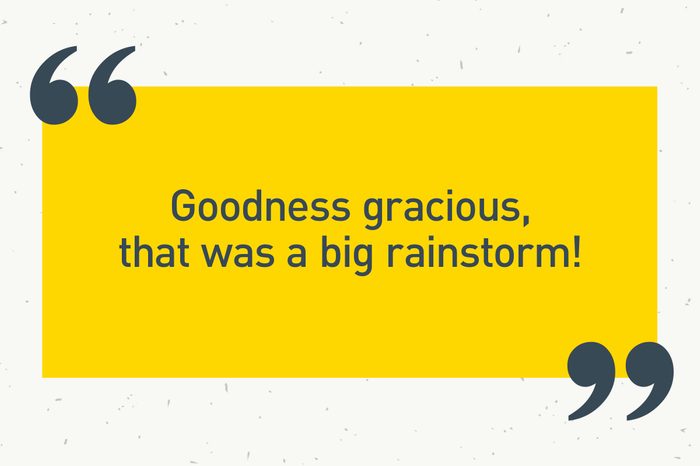
Goodness gracious!
Although it began as a southern expression, saying “Goodness gracious!” when surprised or dismayed eventually spread throughout the United States. According to Dictionary.com, the phrase dates back to the 1700s. Both “goodness” and “gracious” are colloquial expressions that originally referred to the goodness or grace of God, and they were not considered vulgar or blasphemous.

It’s blowin’ up a storm
Speaking of storms, sometimes you can see them coming. The sky darkens, the wind picks up and heavy clouds gather—in other words, “it’s blowin’ up a storm.” Although its origins are unclear, the phrase makes intuitive sense, given that strong winds precede a storm.

Hush up
Instead of “shut up,” you’re likely to hear southern mothers tell their kids to “hush up.” As Ronda Rich wrote in the Gainesville Times, “shut up” is considered rude and on par with other “swear words,” so the softer alternative of “hush up” is used in its place. The word hush dates back to the Middle English word hussht, which in turn came from huissht—an interjection used to call for silence. Its first known use was in 1546, and over time, it made its way into being a common southern saying.

More than Carter has pills
To express having a large amount of something, a Southerner might say that someone has more of it “than Carter has pills.” This expression refers to a popular patent medicine created in 1868 called “Carter’s Little Liver Pills.” Apparently, there were so many of these pills that even though the medicine is all but forgotten, the phrase has stuck around.

Coke
One way to tell which part of the U.S. someone is from is to ask them what they call a sweet, carbonated beverage. People from the Northeast usually say “soda,” while Midwesterners tend to say “pop.” Southerners, however, often refer to any kind of soft drink as “Coke.” Why? One theory is that, because Coca Cola originated in the South—Atlanta, to be specific—and was the first mass-marketed soft drink, the brand name caught on as a generic term and stuck.

Yonder
Ask someone for directions in the South, and there’s a good chance they’ll refer to the place as being “over yonder.” Usually accompanied by a gesture in the general direction, “yonder” refers to a place slightly distant but still within sight, according to Merriam-Webster. “Yonder” is a combination of the Dutch word ginder (meaning “over there”) and the English word yon (an old English term for “over there”).

Well I’ll be John Browned
Southerners have plenty of ways to express surprise. One is “Well I’ll be John Brown,” sometimes “Well I’ll be John Browned.” It rolls off the tongue with the kind of theatrical disbelief that makes you want to tip your hat and squint into the distance. This expression harks back to John Brown, the fiery abolitionist who led a failed slave rebellion at Harpers Ferry, West Virginia, and was hanged for it in 1859. According to one theory, this common idiom from the South implied that someone’s actions were so outrageous that it would lead to their hanging or imminent death. Over time, the dark phrase lost its dramatic edge and came to mean simply that a person was—or felt—damned.

What in the Sam Hill
Given their aversion to swearing, Southerners have come up with creative ways to express themselves. Take “What in the Sam Hill…,” a classic regional phrase from the South that is used in place of an expletive. Though the exact origin is murky, one theory points to a real person named Sam Hill, a copper-mining surveyor with a famously foul mouth. So instead of uttering actual expletives, folks started dropping Sam Hill’s name in their place—as if to say, “Let him do the swearing for me.” This kid-friendly version of cursing joins many other hilarious stand-in phrases used by adults, especially parents, to avoid being a bad influence on any young ones around them.

Madder than a wet hen
If someone is fuming with anger, you might hear a Southerner say the person is “madder than a wet hen.” According to one theory, this is because when hens would get flustered, southern farmers would dunk them in cold water to try to get them to snap out of it, making it easier to collect their eggs. This, of course, left the hens soaked and furious.

Take your own sweet time
Much like “bless your heart,” the phrase “take your own sweet time” may sound polite but is often said sarcastically. Aptly commenting on how slowly someone is moving, the phrase pairs perfectly with a southern drawl. The origins of the phrase are unclear, but it fits neatly into a long southern tradition of using gentle-sounding language to mask irritation or nudge someone along—without being outright rude.

High on the hog
If someone is said to be living “high on the hog,” it means they are doing well and enjoying plenty of comforts and luxuries. One theory of its origin traces back to hog butchering, where the upper (high) cuts—like loin and tenderloin—are considered the finest, unlike the cheaper, tougher parts lower on the animal, such as the hocks or knuckles.

’Til the cows come home
When something is bound to take a long time—maybe even all day—you can say that you’ll be at it “’til the cows come home.” Cows aren’t known for being speedy and typically meander about until feeding time. In other words, if you’re doing something “’til the cows come home,” you aren’t going to be finished anytime soon.

What in tarnation
You’ve probably heard the exclamation “What in tarnation?” but chances are, you haven’t given much thought to where it comes from. Like many other southern expressions and their meanings, “tarnation” is used as a stand-in for stronger words that were once considered impolite or even blasphemous. In this case, it’s a euphemism for “damnation”—as in, eternal damnation in hell—and likely dates back to the late 18th century. To be fair, that is definitely something to be upset about.

If I had my druthers
If you’d prefer to not do something, you may say, “I would rather not.” Alternatively, to give your reply a southern flavor, you could say, “If I had my druthers …” So what in the world are “druthers”? According to one theory, the words “would rather” fused together to form “druthers.” (Say it fast and you’ll hear it.) In fact, it started out as “my drathers,” which appeared in the United States toward the end of the 19th century and soon turned into “my druthers.” The earliest known use dates back to a magazine article in 1870.

I reckon
The southern phrase “I reckon” can be used in place of “I think” to express your opinion about something. The phrase itself can be traced to the Old English word “gerecenian,” which means “to explain, relate, recount, arrange in order.” “I reckon” dates back to the 1600s, and it can be regularly found in the literature of the day. In time, though, it fell out of use in other parts of the country and became established as a southern regional staple.

Slower than molasses in the winter
If someone’s moving at a snail’s pace, you would say that they’re “slower than molasses in the winter.” The origin of this one is as straightforward as it is sticky: If you’ve ever tried pouring molasses from a bottle on a cold day, you’ll know that the thick liquid takes a painfully long time to make its way out. A staple of Lancaster County, Pennsylvania, molasses are found abundantly in southern kitchens, so it makes sense that this phrase caught on and stuck around.

Fine as a frog’s hair split four ways
When someone asks how you’re doing and you want to indicate that you’re doing well, you might grin and say, “I’m finer than a frog’s hair split four ways.” Since frogs are tiny and mostly hairless, any hair they might have ought to be very delicate indeed. Splitting it four ways would only make it finer. Though the exact origin of this delightfully unusual phrase is unknown, one early use appears in C. Davis’s Diary of 1865: “I have a better flow of spirits this morning, and, in fact, feel as fine as frog’s hair, as Potso used to say.”

Full as a tick
Prepare yourself: This one is pretty vivid. After someone finishes off a large, hearty meal—even eating to the point of excess—they might lean back and say “I’m full as a tick.” If you know anything about ticks, it’s probably that they swell up dramatically after feasting on blood. Despite the unpleasant image, this expression has managed to stick around, possibly because of its descriptive imagery.
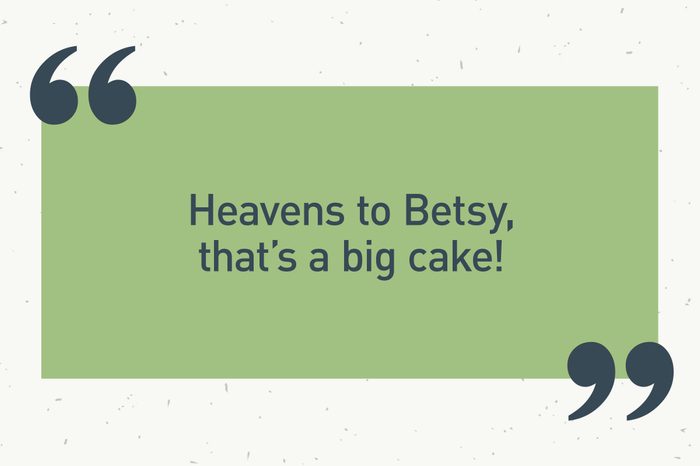
Heavens to Betsy
Another exclamation made the list—this time it’s “heavens to Betsy.” Like many southern sayings, this one is also used to express surprise. And like many others, its origins remain a mystery. In other words, we’re still not sure who Betsy is. The Oxford English Dictionary notes its first written use in 1914, but the expression has likely been around much longer. Some speculate that Betsy is, in fact, Betsy Ross, the woman often credited with sewing the first American flag during the Revolutionary War. While that’s a decent guess, this anecdote remains without evidence, making the usage famously rootless.

Cattywampus
When something is not right, you bet Southerners have a colorful way of pointing it out. In parts of the region, if something is crooked or askew, you might say it’s “cattywampus”—also spelled “catawampus.” Though no one is sure of the word’s specific origins, we do know that it has been around for more than a century, likely derived from the Scots word “wampish,” meaning to “wriggle,” “twist” or “swerve.”

Enough money to burn a wet mule
Someone with significant wealth might be described as having “enough money to burn a wet mule.” But just how much money is that? While there are no official figures, we do know where the expression originated. Back in 1929, Louisiana Governor Huey Long tried to enact a 5-cent tax on every barrel of refined oil produced in the state. Naturally, Standard Oil wasn’t thrilled and used its considerable influence to try to have Long removed from office. Long fought back, claiming that Standard Oil had offered legislators as much as $25,000 each to oust him—or, as he put it, enough money “to burn a wet mule.” Mules were not consulted for their opinion on this widespread regional expression.

As drunk as Cooter Brown
In parts of the South, someone who has had a lot to drink might be described as being “as drunk as Cooter Brown.” Legend has it, Cooter Brown lived along the border between the North and South just before the Civil War. Unwilling to fight and wanting to avoid being drafted by either side, he supposedly stayed constantly drunk so neither army would want him. Whether Brown was real or just part of Southern folklore, his name has been associated with drunkenness for more than a century.
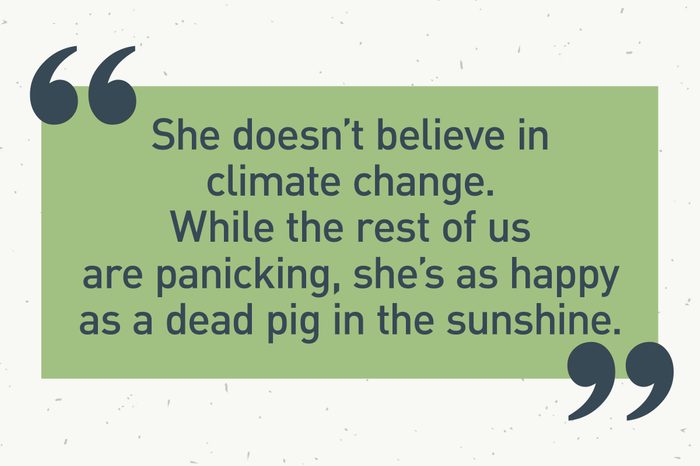
As happy as a dead pig in the sunshine
When someone is blissfully ignorant of reality, Southerners might say they’re “as happy as a dead pig in the sunshine.” Sure, it sounds a tad morbid, and it is, but oddly enough it makes sense. According to one explanation, when a pig dies outdoors, the sun dries out its skin. As the skin tightens, it pulls the pig’s lips back into what looks like a contented grin—even though the pig is, of course, dead. So when a person is “as happy as a dead pig in the sunshine,” it means they aren’t in touch with reality and are happy as a result.

Supper
While many regions use “supper” and “dinner” interchangeably, that’s not the case in the South. According to Moseman, “dinner” refers to the midday meal—typically known as “lunch” elsewhere. And in the South, “supper” is the evening meal that non-Southerners would call “dinner.”
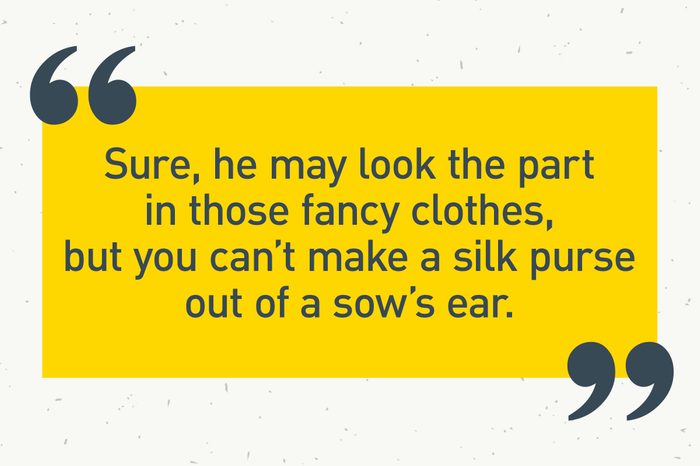
You can’t make a silk purse out of a sow’s ear
As hard as people try to make something look nicer than it is, there have always been ways to call it like it is. One such way in the South is to say that “you can’t make a silk purse out of a sow’s ear.” The expression has been around since at least the 1500s and was originally a proverb meaning that you can’t turn something useless or inferior into something attractive and valuable—no matter how hard you try.

Like a cat on a hot tin roof
In addition to being the title of a Tennessee Williams play, the phrase “like a cat on a hot tin roof” is a southern way to describe a person who is especially agitated or jumpy. One theory behind the expression is that cats aren’t fans of uncertain ground—and on a hot, sloped tin roof, they’d be even more jittery, thanks to the heat and unsteady footing.

If the creek don’t rise
If you’re fairly certain you’ll make it somewhere and would only not go if something major happened, you might say that you’ll be there “if the creek don’t rise.” Despite the best of intentions, a metaphorical rising creek, or an unexpected interference, might keep a Southerner from following through with plans.

As all get-out
In the South, if you want to emphasize a description, you might add the phrase “as all get-out” to the end of a sentence. The expression “get-out”—also spelled “getout”—has been used colloquially to mean “to a high degree of something” since at least 1838.
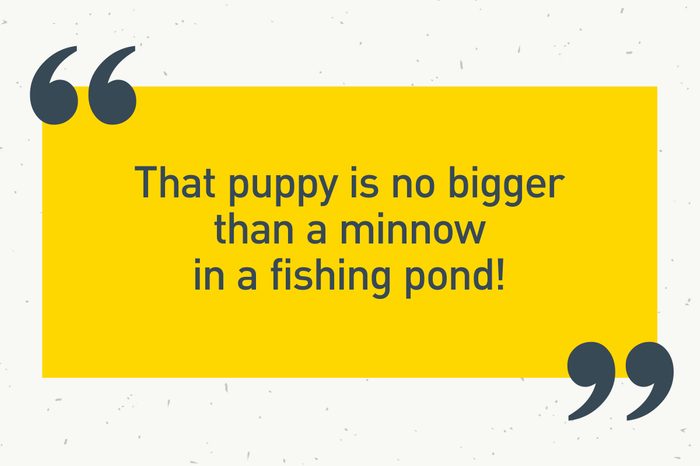
No bigger than a minnow in a fishing pond
Southerners have a great way to express that something is very small—it’s “no bigger than a minnow in a fishing pond.” When a Southerner sets out to catch enough fish to cook up a big family meal and, instead, finds only minnows in the water, those fish will look tiny, and disappointing, as can be.

Too big for his britches
A person who thinks very highly of himself can be described in the South as being “too big for his britches.” The expression is approximately 200 years old and is believed to have originated in the United States. Essentially, it means that someone’s ego has gotten so big that it can no longer be contained by their regular-size pants.

Gumption
If you want to compliment a person for their courage, initiative and spunk, you can say that they have “gumption.” The word originated in 1700s England and Scotland, where it originally meant “common sense”—before it was adopted by Southerners. By the 20th century, “gumption” had evolved into the version we know today.

Well, I Swanee
Rather than saying “Well, I swear” to express disbelief or surprise, Southerners opt to say “Well, I Swanee.” Often heard in the Appalachian Mountains of Southwest Virginia, the phrase has several spellings and is believed to come from the Old English expression “I’ll swanny,” meaning “I shall warrant.”
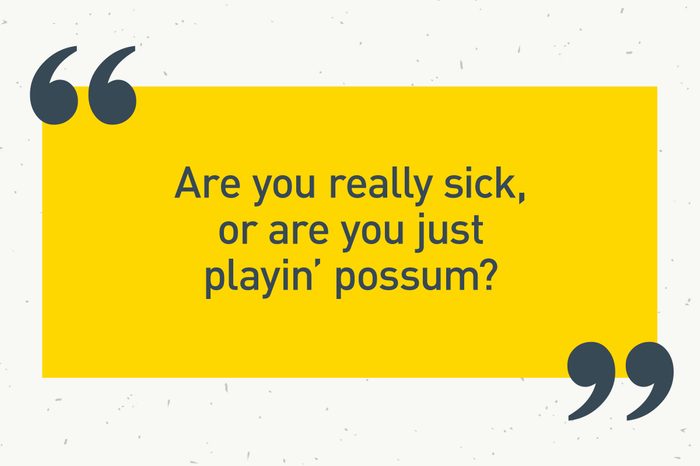
Just playin’ possum
If a Southerner says someone is “just playin’ possum,” it means they think the person is faking it. When a possum—yes, the animal—feels threatened, it often pretends to be dead in order to trick its predators into leaving it alone. The phrase was first recorded in 1822, and it’s been part of southern speech ever since.

As scarce as hen’s teeth
To describe something that is incredibly rare, a Southerner might say it’s “as scarce as hen’s teeth.” This one is pretty straightforward: Hens don’t have teeth, so finding one with a set would be just about impossible. The phrase first appeared in James Gilmore’s 1863 book My Southern Friends and gained popularity during the Civil War.

Can eat corn through a picket fence
If you say that someone “can eat corn through a picket fence,” you are commenting on their buck teeth—suggesting that they are large enough to chomp corn right through the gaps of a fence. The origins of the phrase are unclear, but there’s no denying that it paints a picture.

That dog don’t hunt
In the South, if someone proposes an idea that people know won’t work, someone else might respond with “that dog don’t hunt.” According to one theory, this expression originated in the South in the late 1800s, when hunting dogs were common companions in the field. So if a dog doesn’t hunt, it’s not doing its job—just like a bad idea that won’t go anywhere.

Make groceries
If you’re in the New Orleans area and someone asks you to “make groceries,” don’t head straight to a factory—they just want you to go grocery shopping. The expression “make groceries” comes from the French for doing one’s market shopping, or “faire son marché.” Since faire can mean both “do” and “make,” the phrase was likely translated literally, and the version with “make” simply stuck.

Hankering
If someone has a longing or craving for something, they might say they have a “hankering.” While the exact origin of the word is unknown, it dates back to the 1600s and is likely derived from the Flemish word hankeren, which is, in turn, related to the Dutch word hunkeren, meaning “to hanker or to long for.”
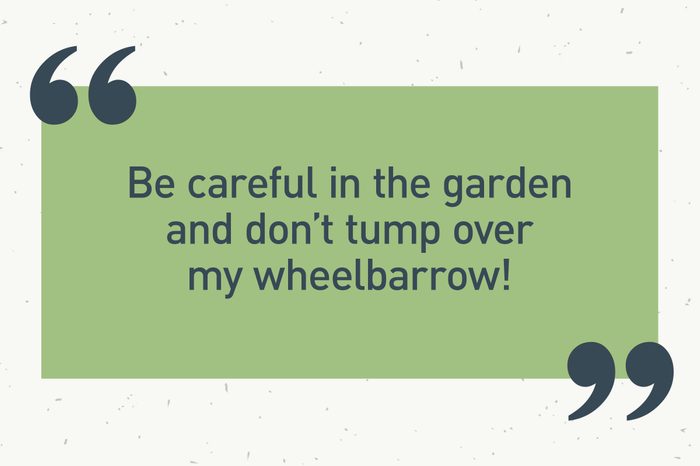
Tump
In some parts of the South, the word tump is used instead of overturn. A blend of tip and dump, it’s identified by the American Heritage Dictionary as a uniquely southern term. Though we don’t know the exact origin, it’s believed to have been first recorded between 1580 and 1590, possibly linked to the British word tumpoke, meaning “to fall head over heels.”

Hissy fit
A person throwing a tantrum is often described as having a “hissy fit.” The expression is believed to have originated in the early 1900s, though there’s some disagreement about its exact meaning. Some believe it evolved from “hysterical,” while others think it refers to the hissing sound an agitated person would make.

Don’t let the door hit you where the good Lord split you
Looking to get rid of someone? There’s a southern expression for that: “Don’t let the door hit you where the good Lord split you.” According to Moseman, this phrase can be a great alternative for “Don’t let the door hit you on the way out” or “Get lost!” According to Geneva Smitherman’s book Talkin and Testifyin: The Language of Black America, the phrase is African American slang. It’s a “nasty command to leave,” with “split you” serving as a euphemism to avoid the obvious profanity.

Fair to middling
If someone asks you how something is going and it’s neither terrible nor amazing, you might say it’s “fair to middling.” The expression dates back to the early 1800s, and the word middling is an old Scots word in use at least since the 15th century, when it carried the same meaning it does today: “of medium or moderate size, strength and quality.”
Why trust us
At Reader’s Digest, we’re committed to producing high-quality content by writers with expertise and experience in their field in consultation with relevant, qualified experts. We rely on reputable primary sources, including government and professional organizations and academic institutions as well as our writers’ personal experiences where appropriate. We verify all facts and data, back them with credible sourcing and revisit them over time to ensure they remain accurate and up to date. Read more about our team, our contributors and our editorial policies.
Sources:
- Time: “Y’all: It’s Older Than We Knew”
- Bourbon and Boots: “15 Odd Southern Sayings Their Origins”
- Pop Culture Kings: “Just in the Nick of Time: A History of Interesting Idioms and Colloquial Phrases – Part 1”
- Battle Fields: “John Brown”
- Gainesville Times: “It’s much nicer to say ‘hush’ instead of ‘shut up’”
- Compass Journals, Language and Linguistics: “Enregisterment: How linguistic items become linked with ways of speaking“
- Mel Magazine: “WHY ‘BLESS YOUR HEART’ IS THE MOST SAVAGE INSULT IN THE COUNTRY”
- War History Online: “Who Is Cooter Brown and What Does ‘Drunker Than Cooter Brown’ Mean?”
- Talkin and Testifyin: The Language of Black America, Geneva Smitherman
- My Southern Friends, James Robert Gilmore
- The Coca-Cola Company: “Our Company”
- Huey Long: “Impeachment”




















